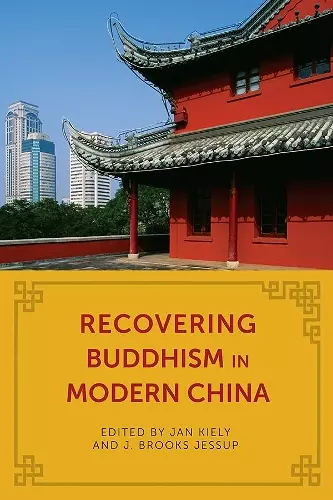Recovering Buddhism in Modern China
Jan Kiely editor J Brooks Jessup editor
Format:Hardback
Publisher:Columbia University Press
Published:15th Apr '16
Currently unavailable, and unfortunately no date known when it will be back

Modern Chinese history told from a Buddhist perspective restores the vibrant, creative role of religion in postimperial China. It shows how urban Buddhist elites jockeyed for cultural dominance in the early Republican era, how Buddhist intellectuals reckoned with science, and how Buddhist media contributed to modern print cultures. It recognizes the political importance of sacred Buddhist relics and the complex processes through which Buddhists participated in and experienced religious suppression under Communist rule.
Restores the vibrant, creative role of religion in postimperial ChinaModern Chinese history told from a Buddhist perspective restores the vibrant, creative role of religion in postimperial China. It shows how urban Buddhist elites jockeyed for cultural dominance in the early Republican era, how Buddhist intellectuals reckoned with science, and how Buddhist media contributed to modern print cultures. It recognizes the political importance of sacred Buddhist relics and the complex processes through which Buddhists both participated in and experienced religious suppression under Communist rule. Today, urban and rural communities alike engage with Buddhist practices to renegotiate class, gender, and kinship relations in post-Mao China. This volume vividly portrays these events and more, recasting Buddhism as a critical factor in China's twentieth-century development. Each chapter connects a moment in Buddhist history to a significant theme in Chinese history, creating new narratives of Buddhism's involvement in the emergence of urban modernity, the practice of international diplomacy, the mobilization for total war, and other transformations of state, society, and culture. Working across an extraordinary thematic range, this book reincorporates Buddhism into the formative processes and distinctive character of Chinese history.
Recovering Buddhism in Modern China is cutting edge, with contributions from bright and energetic young scholars. The results of their collaboration have the potential to significantly reshape our views on the development of modern Chinese Buddhism. -- Paul Katz, research fellow, Institute of Modern History, Academia Sinica Recovering Buddhism in Modern China is a great contribution to the emerging field of study of Buddhism in twentieth-century China. The volume examines lay and monastic Buddhism, cultural practices and intellectual debates, state and society. In addition to well-analyzed case studies, this book offers new insights on important conceptual theories and research methodologies for this new and challenging field. This is an important book for graduate students and scholars who research religion in modern China, modern Chinese Buddhism, and modern Chinese history. -- Stefania Travagnin, director of the Centre for the Study of Religion and Culture in Asia, University of Groningen The study of modern Chinese Buddhism was long like a shy child living under the shadow of its creator, Holmes Welch. Over the last ten years it has suddenly become a young adult bursting with life and ideas. This beautiful volume showcases its coming of age, reflecting the lived religion in its manifold aspects, from politicians and intellectuals to old ladies and from the exploration of the staggering wealth of written materials to the ethnography of fast-changing practices. -- Vincent Goossaert, Ecole Pratique des Hautes Etudes [An] extremely insightful volume about how Buddhism affects Chinese state and society. The contributor's scholarship is unmatched and impeccable. This work answers many questions that had not been covered yet. The Washington Book Review This is an excellent book that deserves to be widely read. Scholars of modern Buddhism will find much of interest, of course, both substantively and theoretically. True to its ambition, the book also has much to offer scholars of modern China and it is very much to be hoped that it reaches that audience. Graduate students looking for a single book on modern Chinese Buddhism for their generals list will certainly want to choose this one not only for the breadth of its coverage but also as a sampler plate of an exciting emerging field. Certain chapters might even be assigned to advanced undergraduates in relevant classes. -- Justin R. Ritzinger H-Buddhism
ISBN: 9780231172769
Dimensions: unknown
Weight: unknown
400 pages